Is your cat too fat?
What are the causes and consequences of excess weight in cats and how can cats lose those extra pounds?
Fat cats? It’s a heavy subject in the truest sense of the word. But it’s something we absolutely have to address! We’re not talking about any kind of superficial beauty ideals or whether cats with Rubenesque figures can be neat and dapper. For feline fans, the “fun” stops when being overweight means your cat might suffer long-term health consequences. Indeed, this is where every cat lover’s alarm bells should start to ring! Excess weight is often the result of a misguided notion of love. In fact, anyone who really cares about their cat should declare war on those extra pounds – with the ferocity of a lion!
At what point is a cat considered overweight?
Is my cat overweight? At what point is this the case? A cat that’s fit has an average weight within the norm. For pedigree cats, there are specific criteria based on the standard for each breed. A cat that weighs more than 15-20% of its ideal weight is considered overweight. Unfortunately, determining a cat’s ideal weight outside of breed standards is a bit trickier. However, the “BODY CONDITION SCORE” can provide orientation in the matter of “cat body weight”. At the very least, it will directly relate the individual parts of your cat’s body to each other:
Download PDF “Body condition score”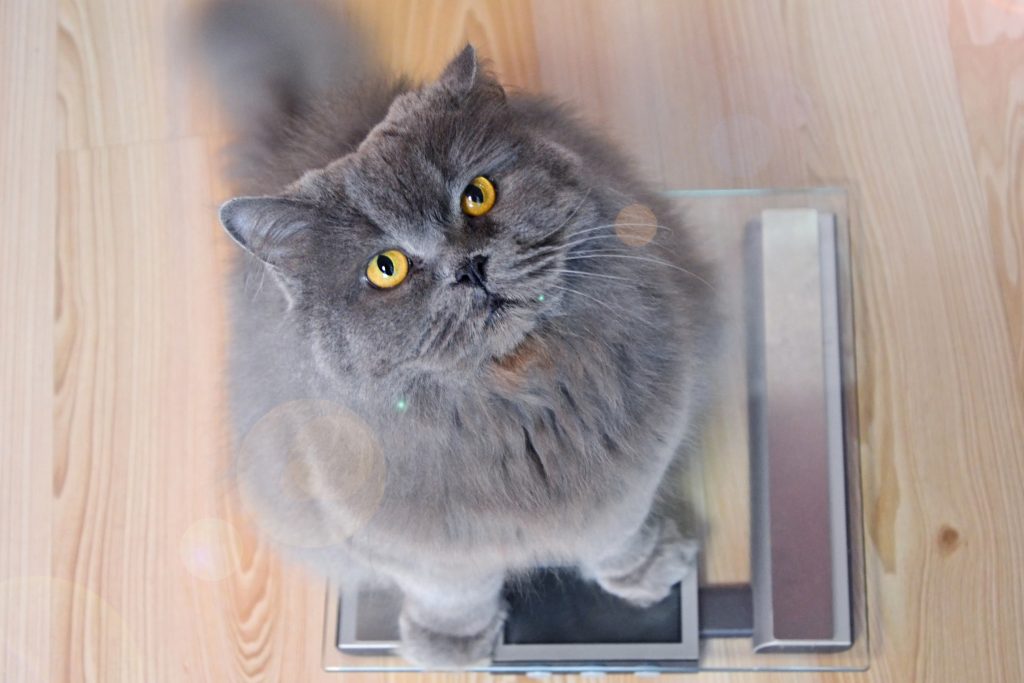
Difficulties moving
Is your cat sporty, does s/he move around a lot? Or are they more of a couch potato, one that prefers to lounge around on the sofa all day, only getting up to eat? Just imagine if you had to carry a heavy rucksack around with you all day. Exactly, it can’t be very pleasant having that extra burden on your back at all times! With a pack like that, your cat will simply have a hard time moving.
Bad mood
Imagine lying on your back, opening your mouth and being given food and treats just like that. Cats in this situation don’t have to worry about anything. They just flop over to their bowls then flop back to their beds. But something truly essential is missing here: the “action”! As a hunter, you cat’s body is designed for sneaking, jumping, climbing and doing fast sprints. In other words: a cat’s body needs movement! Without it, your kitty will be in a bad mood.
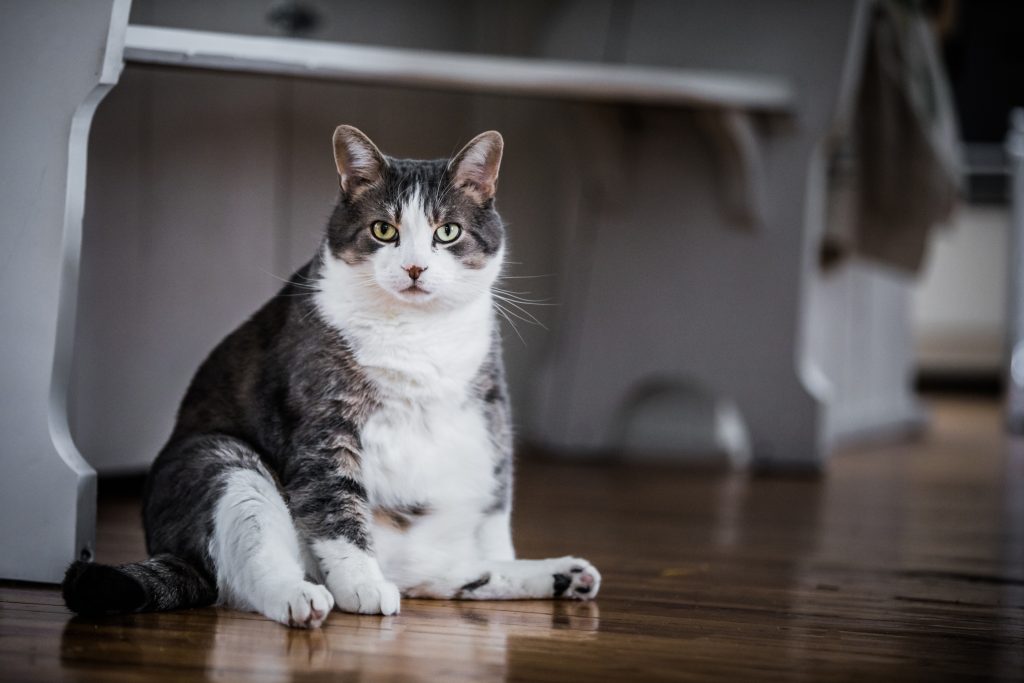
No visible waist
When it comes to feline fitness, being an outdoor cat has certain advantages. Cats that are allowed outdoors can live out their basic instincts: lurking, catching and keeping prey, climbing and jumping. This not only challenges their senses but also burns off a lot of energy! A cat that lacks exercise will get chubby. Pretty soon, they’ll have no visible waist either.
TIP: HANDLING 👐: You should be able to feel your cat’s ribs when you place your hands loosely on their chest. However, the ribs should not be visible from a distance!
Increased need for sleep
Adult cats sleep 12 to 16 hours a day. The sleeping rhythm your cat prefers depends on the season the time of year, their hormone balance and metabolism. Cats are extremely flexible in this respect and sometimes adjust their sleeping times. Obese cats often have an increased need for sleep.
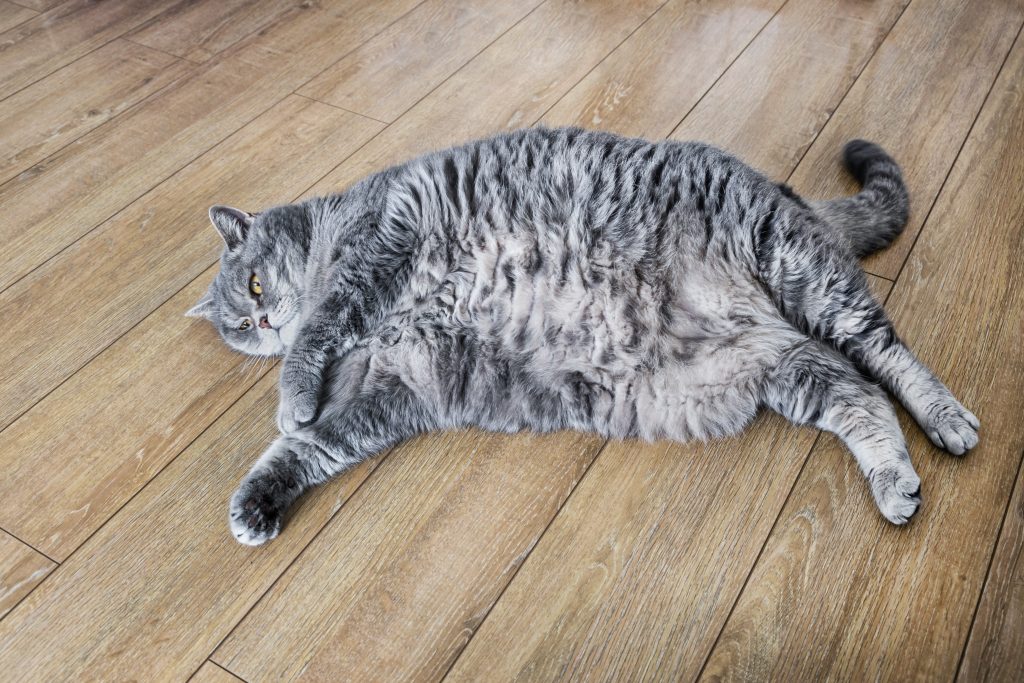
Causes of excessive weight in cats
Excessive weight gain in cats can have many causes. When a kitty puts on too much “flab”, it might be the result of a physical condition, a metabolism problem, too little exercise or overfeeding, among others. The basic problem is that the cat is taking in far more calories than they’re using up in energy. The cat’s body then automatically creates fat reserves designed for use if times get tough and there’s little food available. But not only is this unnecessary, it’s also unhealthy. It can lead to your cat becoming ill and not living as long as it could.
Lack of exercise
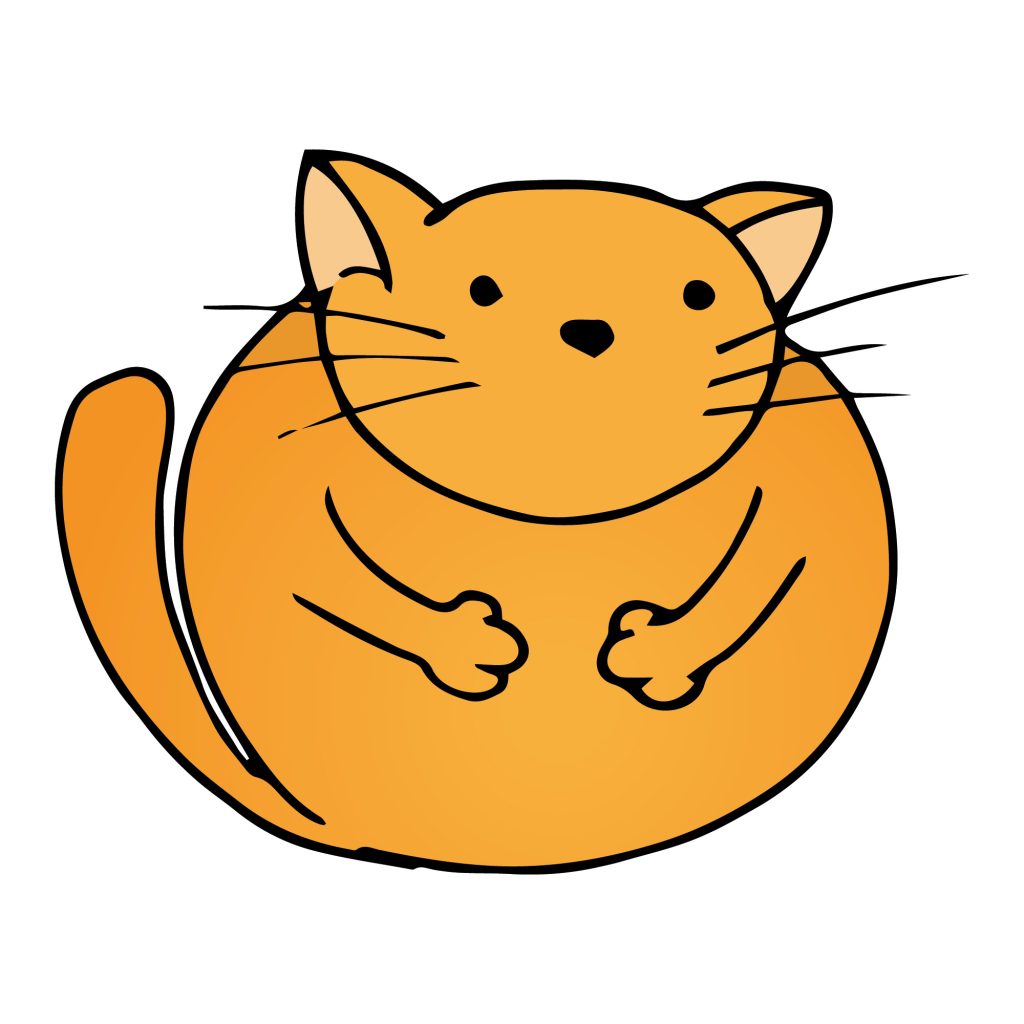
Cats that don’t move around much don’t burn enough energy, so they put on weight. If your cat remains overweight and inactive, they will eventually run the risk of
- muscle loss
- digestive problems
- heart and circulation problems
It’s a vicious circle. The more weight your kitty carries around with them, the less they’re able to move “properly”. This causes stress. And when our feline friends experience stress, they sometimes eat even more than before! This comfort eating prompts them to put on more and more weight…
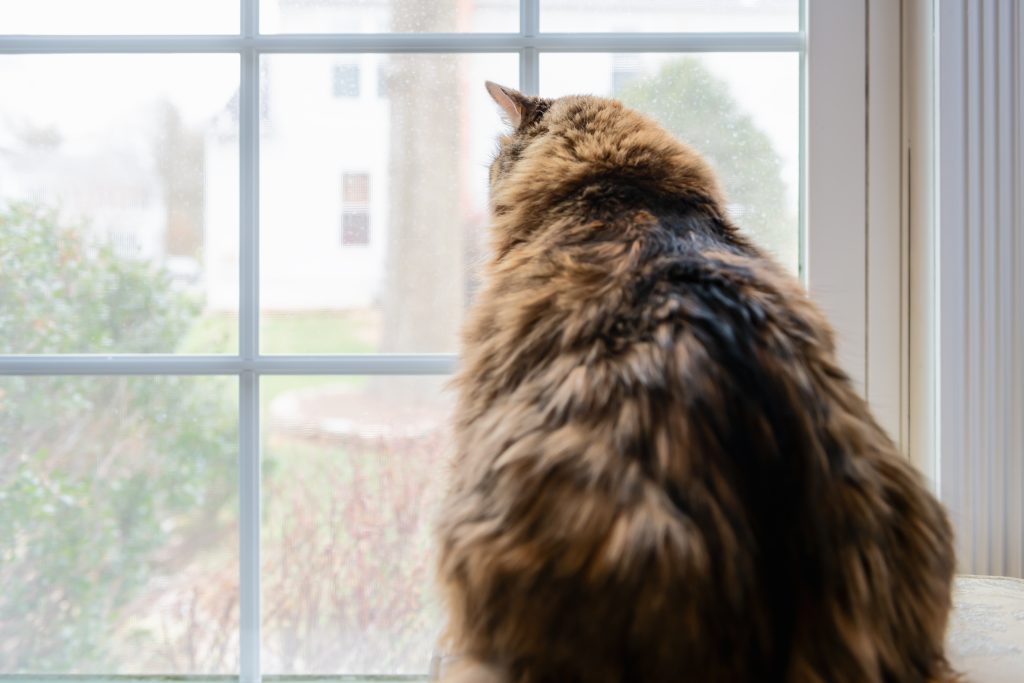
Gender
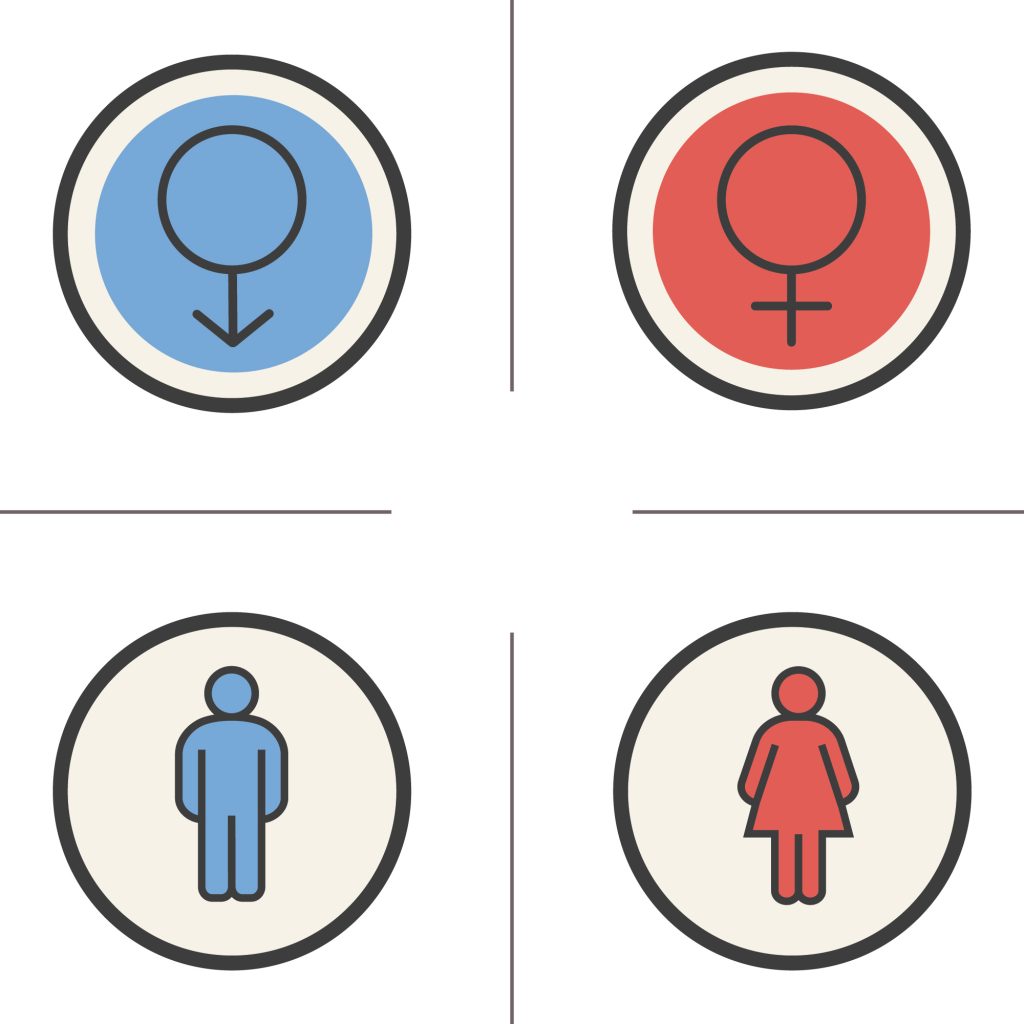
Is there such a thing as a genetic predisposition to excessive weight and/or obesity? Male cats usually weigh more than female cats. Well-built males already weigh more than females because of their more compact stature. On the other hand, they also patrol larger territories and burn more calories in the process. From a purely statistical point of view, obesity in cats is also related to gender; that is, more males than females tend to be overweight.
Neutering
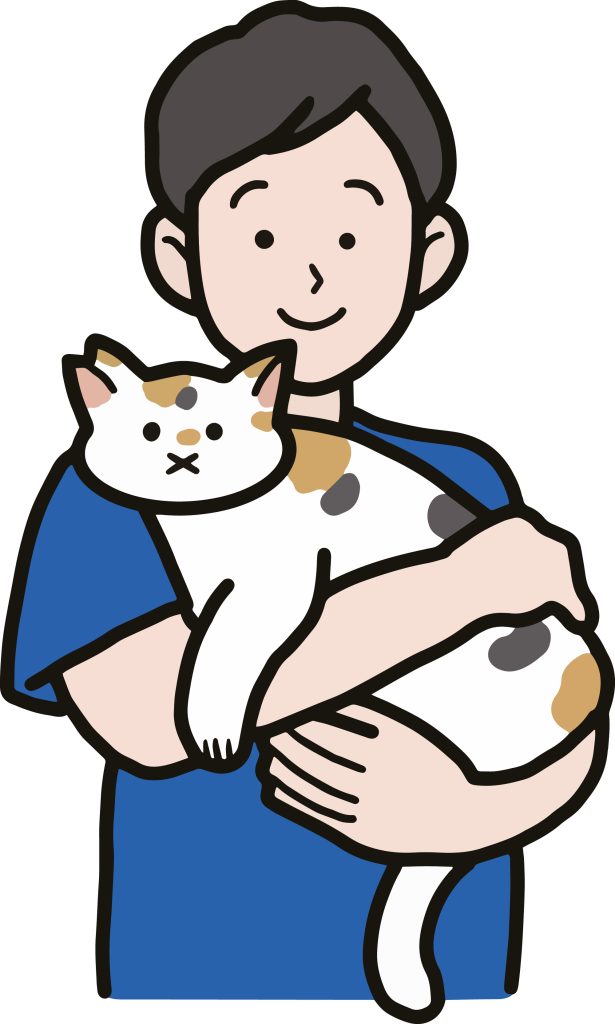
Weight gain after neutering. Why does this happen? When a cat’s hormone ratio shifts, this also influences their metabolism. In other words, neutered cats suddenly have a different sense of satiety and a bigger appetite. However, if the cat’s diet is adjusted prior to neutering they will be able to maintain their body weight.
Diseases
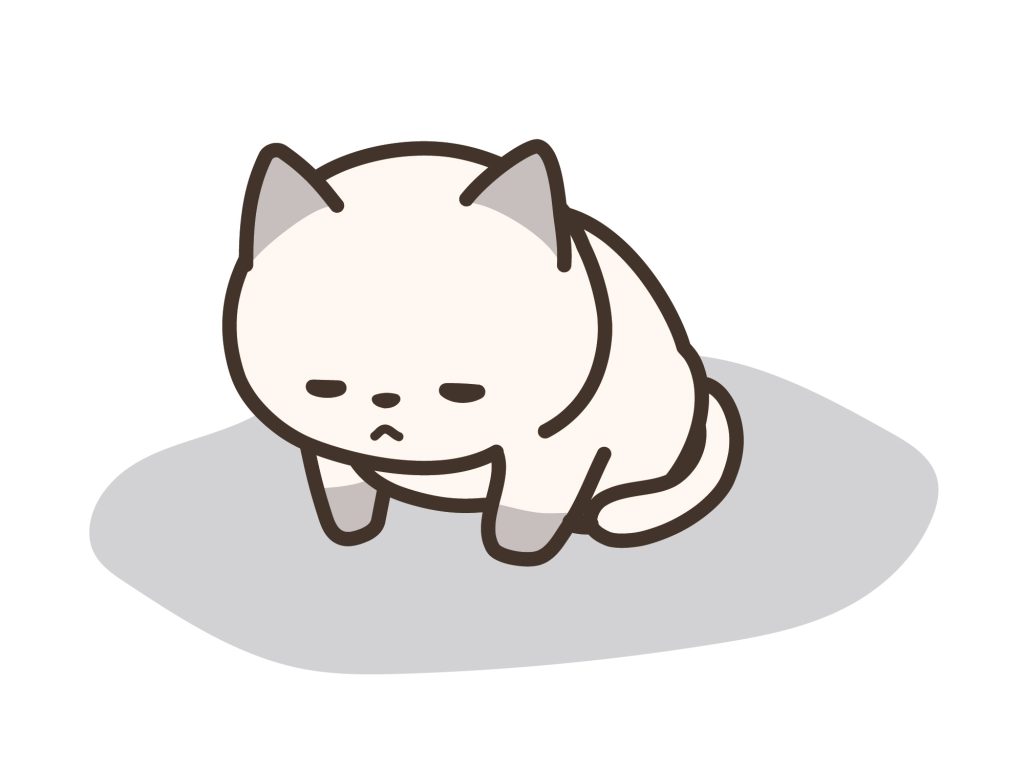
If your cat is overweight, it’s possible that their excess pounds were caused by some kind of disease. For example, certain diseases associated with the thyroid glands and kidneys can affect a cat’s metabolism, causing your furry friend to suddenly put on a lot of weight. If nothing has changed – as far as food, habits and rhythm of life are concerned – and your cat is still getting wider and wider, then it’s better to be on the safe side and take them to a vet for a health check.
Breed
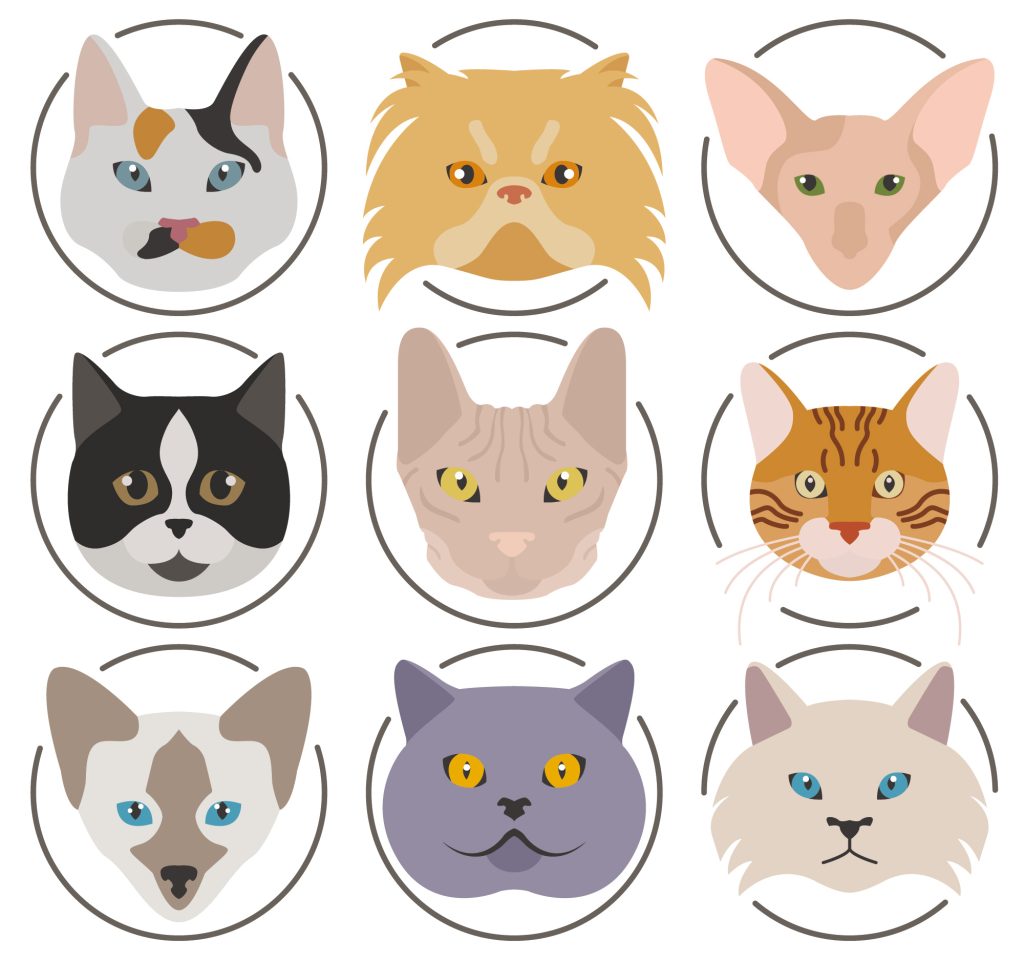
The specific breed of cat can also play a role in causing those extra pounds. For example, breeds that aren’t very active tend to be more overweight than lively daredevils who enjoy running around all day. Just put yourself in your cat’s “shoes”: you’re a hunter, so what’s your favourite thing? Exactly! Hunting, lurking and, of course, capturing prey! When you create stimuli that satisfy these needs in your cat, you’ll be helping to fight off those excess pounds!
Overfeeding
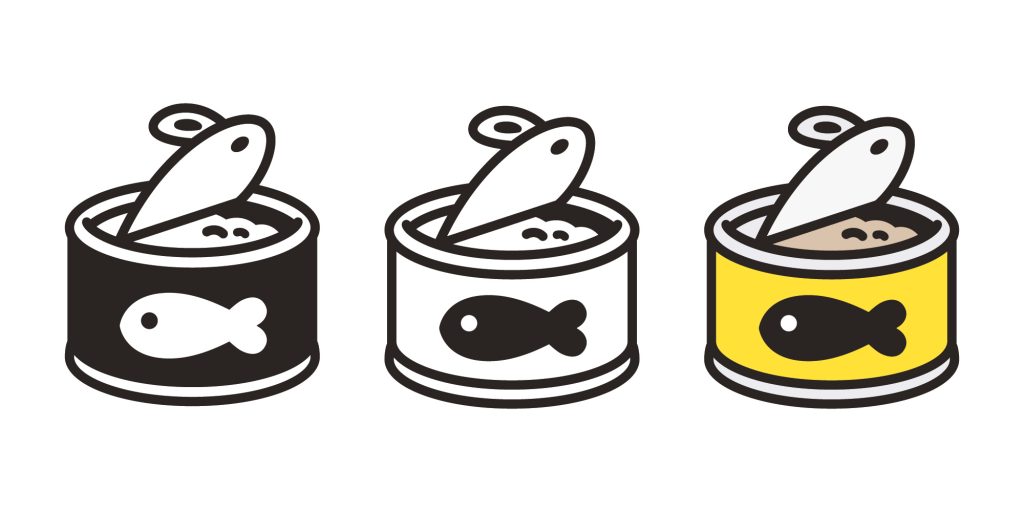
Constant overfeeding: the portions recommended by manufacturers are often too large – surprise, surprise – and they’re happy when big amounts of food go into our cats’ bowls. Cat treats and cow’s milk are also full of calories! When a cat’s small stomach is given food, treats and extras intended for two-legged friends, their organism simply can’t burn it all, which leads to the development of excess fat.
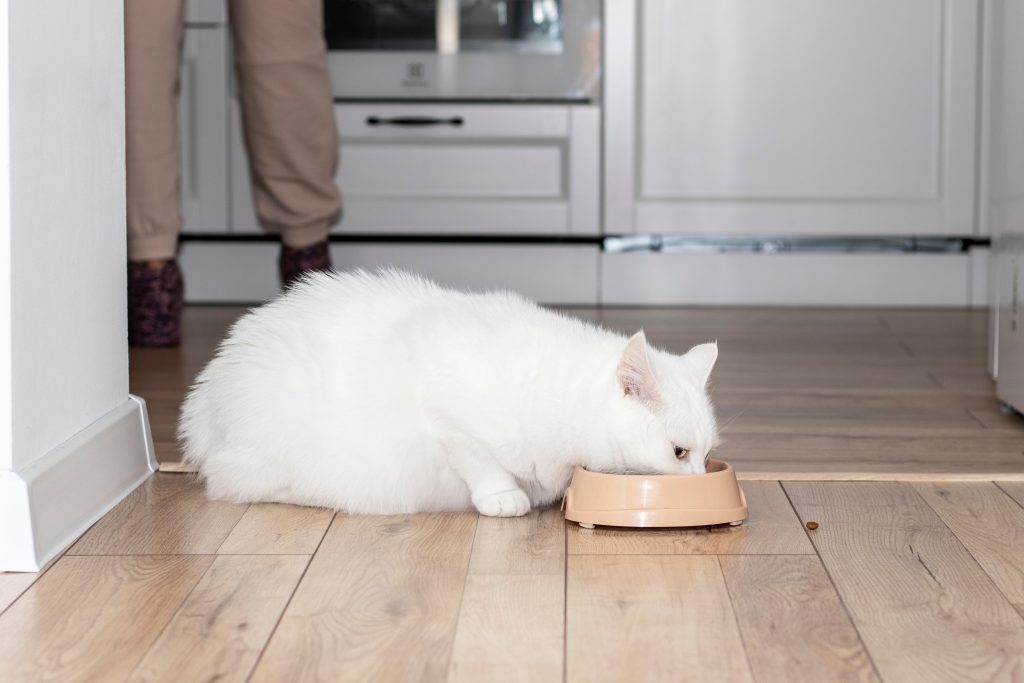
Consequences of excess weight in cats
Imagine having to carry around a 40-kilo weight with you at all times. It would be a real burden that you’d feel with every step you take. Everything would move slower than usual, and it wouldn’t take long before you’d be out of breath. The consequences of excess weight in cats are health issues. Your cat’s body is simply not made to carry such extra weight! Fat cats are more prone to developing diabetes and bladder, kidney, bone and joint problems than cats that don’t have to deal with extra loads.
Lower feline life expectancy
“Love handles” sound like a positive thing, right? Unfortunately, living with too much fat in places where it doesn’t belong is anything but fun! In fact, life under a layer of extra flab is dangerous over the long run. On average, overweight animals don’t live as long as their normal-weight compatriots and their life expectancy even decreases. Plus, being overweight not only shortens life by 2 years, it makes life less liveable.
Problems with coat and skin
Overweight cats often have problems with their skin and coat. Why is that? Well, a fat cat can’t groom itself properly because it simply won’t be agile enough. A cat’s grooming process always involves certain rituals and requires a level of dexterity to reach all parts of the body, even the most remote ones. So if cats can’t reach these spots, their skin- and coat-grooming sessions will come up short in the long run.
Cat is in pain
When cats have to carry around more weight than nature designed them to bear, it eventually becomes a real strain on their whole body. Sooner or later, it can cause your cat a lot of pain. Basically, if your cat’s every movement hurts, it will prefer to be less active. In turn, this will lead to the depletion of more and more muscle. As a result, the entire musculoskeletal system – including ligaments and tendons – will increasingly atrophy.
Types of cat diseases
A cat’s body can endure a lot, but in the long run, even a feline will get weak in the knees. At this point, their health problems will increase. Carrying excess weight makes cats sick. Many diseases in cats are the direct result of being overweight, for example
- osteoarthritis
- bladder problems
- diabetes mellitus (diabetes)
- fatty liver syndrome
- heart and circulatory problems
- lung problems
- digestive problems*
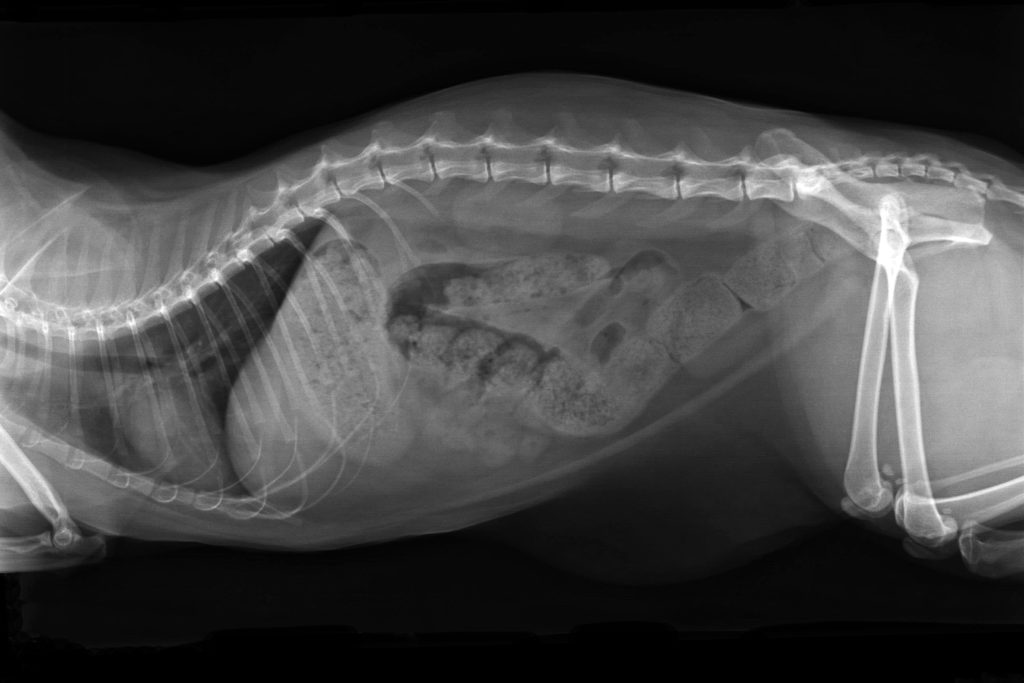
*= Radiograph of an overweight cat with complete intestinal blockage. Lateral view.
It’s a long list. And it makes you think, doesn’t it? But that’s not all: the immune system of overweight cats is also weakened, which makes fat cats even more susceptible to serious disease and illness. And if they have to undergo a procedure or an operation, obese cats are categorised as belonging to the group of “risk patients”.
What should you do if your cat is too fat?
But what can you do if your cat is too fat – or even obese? Should you simply put them on a zero diet or give them half of what they normally eat, then hope they become slim as a whip in no time? That won’t work! Simply cutting back on food will not only cause discontent, it’s also harmful, as the cat’s body will be deprived of important nutrients. Here’s what you should do: give your cat an appropriate amount of food and feed them at fixed times. Also, only give them a limited number of treats. And, of course, they should get sufficient physical exercise!
Ask your vet
Would you like your cat to lose weight, but you’re not sure how best to go about it? Then ask your vet first! They will examine your cat thoroughly and determine its ideal weight. With the help of a diet plan that controls calorie intake, you can then make the shift in your cat’s eating habits. The plan should be tailored specifically to your cat and also involve regular weight checks. Then it’s off to the races and off with those extra pounds!
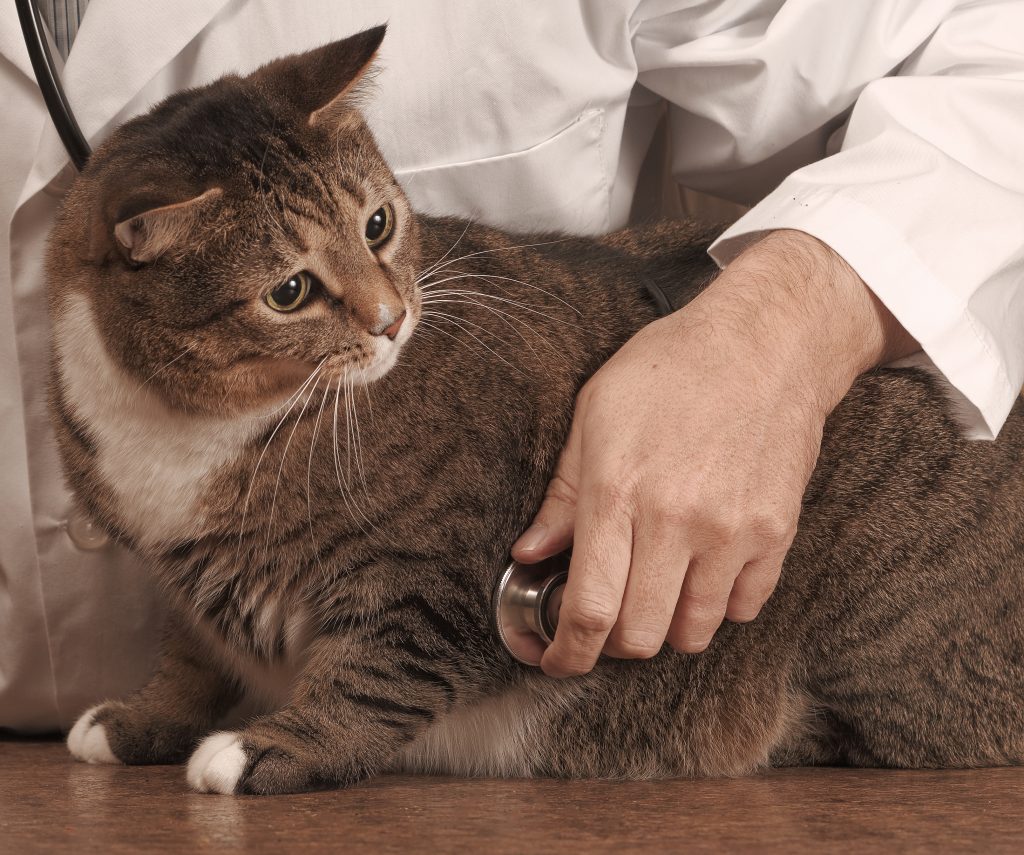
Cat diet
You can help your cat lose weight with a cat diet. Just purchase calorie-reduced diet food that has less fat, while also containing substances that stimulate the burning of fat and foster your cat’s immune system. This is still a complete meal with all the important nutrients and vitamins. With a consistent change in diet, the right food and exercise, it’s possible to bring your furry friend’s extra weight back under control.
Feeding overweight cats correctly
When choosing the right food for an overweight cat, you should make sure that it’s low in calories but still contains enough protein that your cat can digest easily. This protein will ensure that they’re not missing out on any muscle mass after completing the diet; instead, it should be their excess fat that disappears. Follow the plan and see it through. Stick to it, even if your cat begs you to change your mind!
- Create a diet plan
- Reduce the amount of food gradually
- Allocate several small amounts of food per day
- Check your cat’s weight regularly
ATTENTION: One portion of dry food has more energy than the same portion of wet food!
Does your cat eat too much?
If your cat eats too much, there are a number of possible reasons why. For example, it might have to do with their feeding time and routine. Cats tend to eat small portions and usually only when they feel like it. But if they’re given food once a day, and only one bowl at that, they’re probably going to eat everything all at once – just to be on the safe side! Also, shy members of a multi-cat household might be afraid of missing out, prompting them to rush through and eat more than is actually good for them.
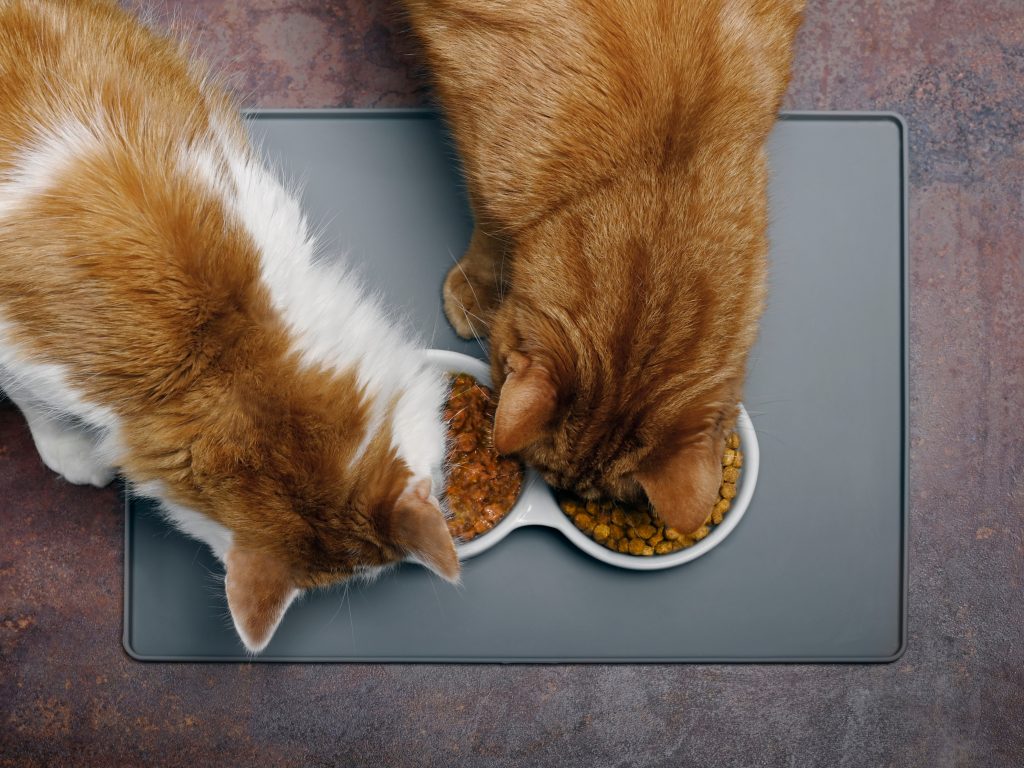
What should you do if your cat is always hungry?
If your cat is always hungry, you should try to get to the bottom of it and go for a health check at the vet. If your kitty is healthy, what else could it be? Might there be something new or different in the environment that’s troubling them? Could their “comfort eating” have a psychological cause? Have you moved homes? Is there a new form of competition at home? New furniture? A new addition to the family? Have you changed your schedule and the times you’re home? See if you can figure it out and adjust it, if possible.
The fattest cat in the world
Cat superlatives abound: Which cats are the biggest and which are the smallest in the world? What are the criteria in this category? People tend to want to categorise everything: WHO or WHAT is the biggest and best in its field? There’s a reason for things like the Guinness Book of Records, which records superlative achievements for the ages. There are also cat lovers who think fat cats are cool and give them trophies.
Skinny is the fattest cat in the world
Skinny is a famous cat! He’s from Dallas and weighs 20 kg. That makes Skinny the fattest cat in the world. A sad record? He was a cat that grew fatter and fatter after his birth in 2007. Skinny recently lost many of his pounds with the help of a medically supervised diet and exercise plan. Today, he weighs “only” 7.7 kg. He’s fit and agile and enjoying life as a cat again.
Quelle: Skinny the fat cat, [YouTube-Video.], 22.08.2015, von otto corsie, Crazy Frog – Tricky (Official Video) , Skinny the fat cat – YouTube, zugegriffen am 13.04.2022
FAQs – Fat cat
A cat that weighs more than 15-20% of its ideal weight is considered overweight.
The “BODY CONDITION SCORE” can provide orientation with regard to “cat body weight”.
Cats get big bellies when they take in more calories than they’re able to burn off.
The causes of excessive weight in cats include a lack of exercise, their gender, being neutered, diseases, their breed and overfeeding.
Males have a greater tendency to become overweight than females.
Cat breeds that aren’t very active tend to be more overweight than the frisky daredevils that belong to more active breeds.
Neutered cats are more likely (but not always!) to be fatter than non-neutered cats.
Neutered cats have a different sense of satiety and a bigger appetite, which makes them put on “flab” more easily than non-neutered cats.
The consequences of obesity in cats include problems with coat and skin, various diseases, pain and shorter life expectancy.
Excessive weight shortens life expectancy in cats by 2 years.
Common diseases in overweight cats are osteoarthritis, bladder problems, diabetes mellitus, fatty liver syndrome, cardiovascular problems, lung problems and digestive problems.
Consult your vet and create a diet plan for your cat.
You should feed them gradually reduced amounts of food according to an approved diet plan.
You can help your cat lose weight by putting them on a cat diet. Special calorie-reduced diet food can help.
It involves feeding your cat several small amounts of food per day and checking their weight regularly.
Dry food is higher in calories than wet food and therefore makes a cat fatter.
If your cat eats too much, there are a number of possible reasons for this. For example, it might have to do with their feeding time or general routine.
If your cat is always hungry, you should get to the bottom of it. Check whether there might be any physical or psychological causes and find a solution for your cat.
Offer your cat smaller amounts of food and spread it out over the day.
Skinny is considered the fattest cat in the world.
Before his diet, Skinny weighed 20 kg.

